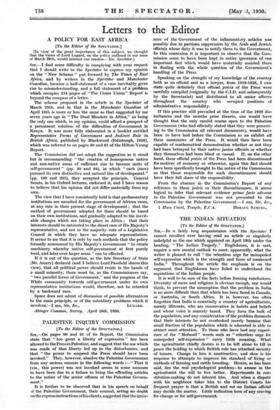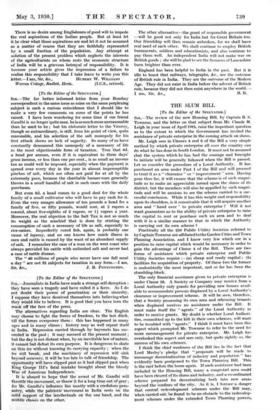THE INDIAN SITUATION
[To the Editor of the SPECTATOR.] Stu,—In a fairly long acquaintance with the Spectator I cannot recollect ever having read an article so singularly unhelpful as the one which appeared on April 19th under the heading, "The Indian Tragedy." Englishmen, it is said, require a new mental outlook to meet, apparently, what the writer is pleased to call "the relentless urge for unimpeded self-expression which is the strength and force of awakened India." Throughout the article the emphasis is on the argument that Englishmen have failed to understand the aspirations of the Indian people.
It is well to be sure of the facts before forming conclusions. Diversity of races and religions is obvious enough, one would think, to prevent the assumption that the problem in India is no more difficult than that which has been faced in Canada, or Australia, or South Africa. It is, however, too often forgotten that India is essentially a country of agriculturists, mainly illiterate, who are conservative in habits and beliefs and whose voice is scarcely heard. They form the bulk of the population, and any. consideration of the problem demands that their interests be not overlooked merely because that small fraction of the population which is educated is able to attract most attention. To those who have had any experi- ence of the " Mofussil " words such as "relentless urge for unimpeded self-expression" carry little meaning. What the agriculturist chiefly desires is to be left alone to till in peace the holding to which British rule has attached security of tenure. Change to him is unattractive, and slow is his response to attempts to improve his standard of living or methods of farming and cattle breeding. Herein, as has been said, lies the real psychological problem—to arouse in the agriculturist the will to live better. Experiments in con- stitution-making do not interest him. And when a dispute with his neighbour takes him to the District Courts his frequent prayer is that a British and not an Indian official may decide the matter. Little indication here of any craving for change or for self-government, There is no desire among Englishmen of good will to impede the real aspirations of the Indian people. But at least let it be clear what those aspirations are and let it not be assumed as a matter of course that they are faithfully represented by a small fraction of the population. Any attempt at solution of the present problem which neglects the interests of the agriculturists on whom rests the economic structure of India will be a grievous betrayal of responsibility. It * because your article gives the impression of a failure to realize this responsibility that I take leave to write you this Warren Cottage, Radlett, Herts. (I.C.S., retired).















































 Previous page
Previous page